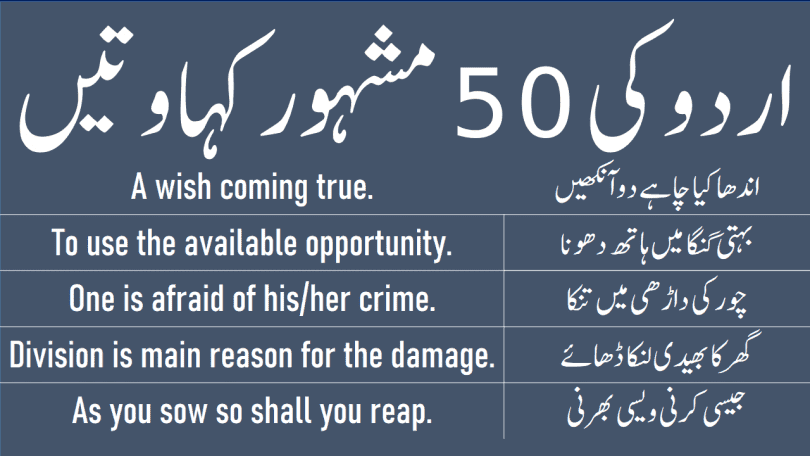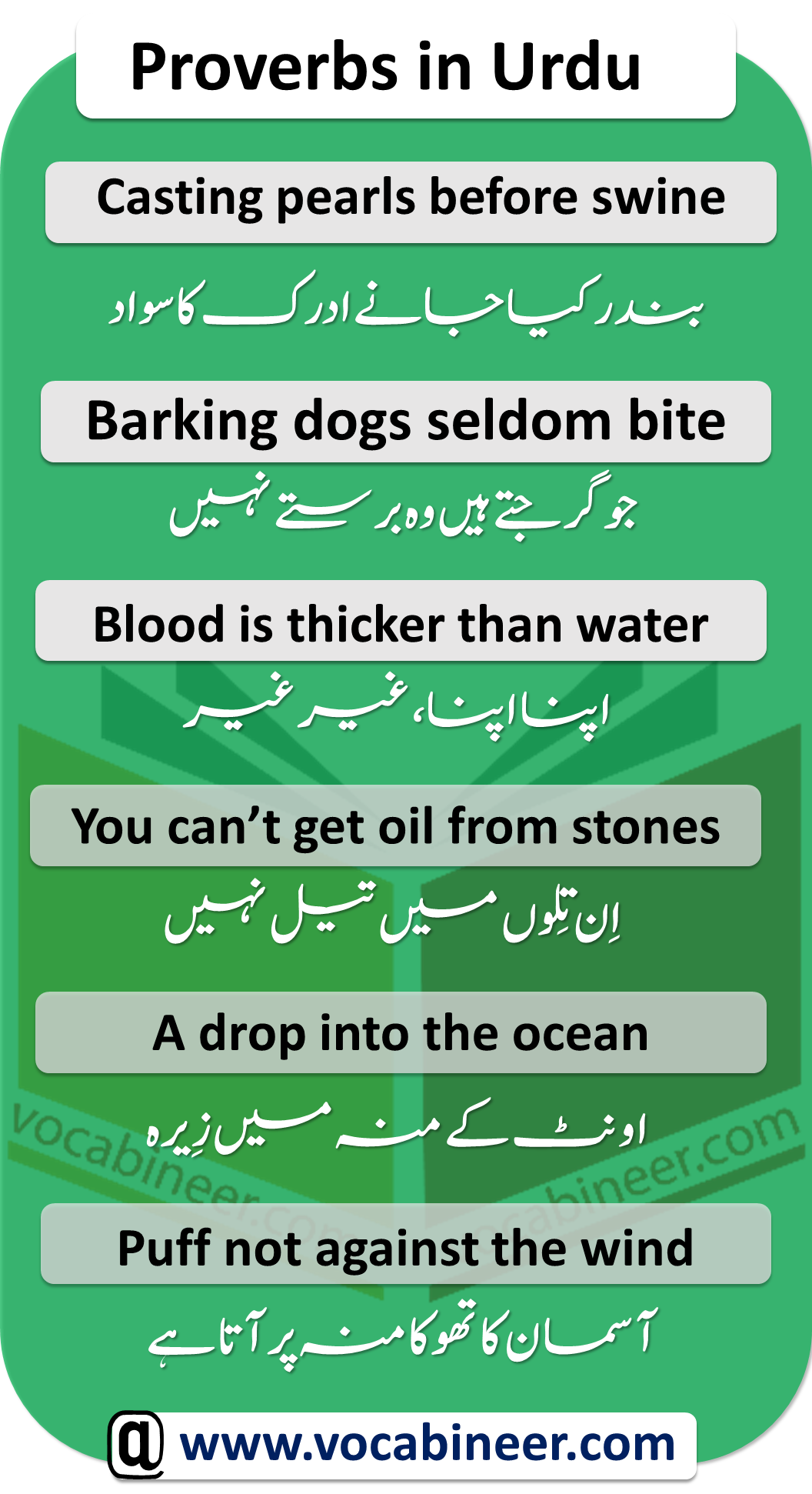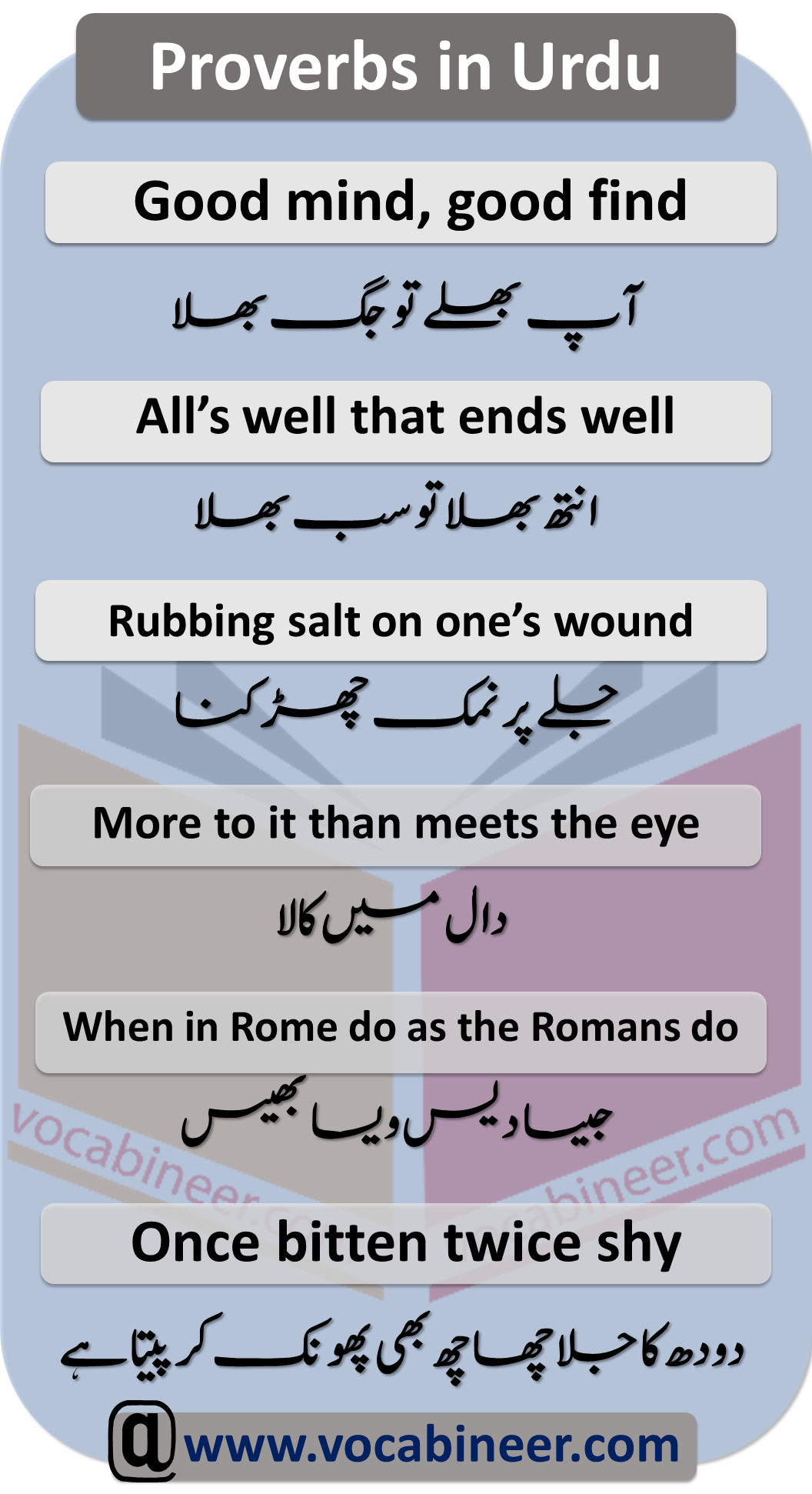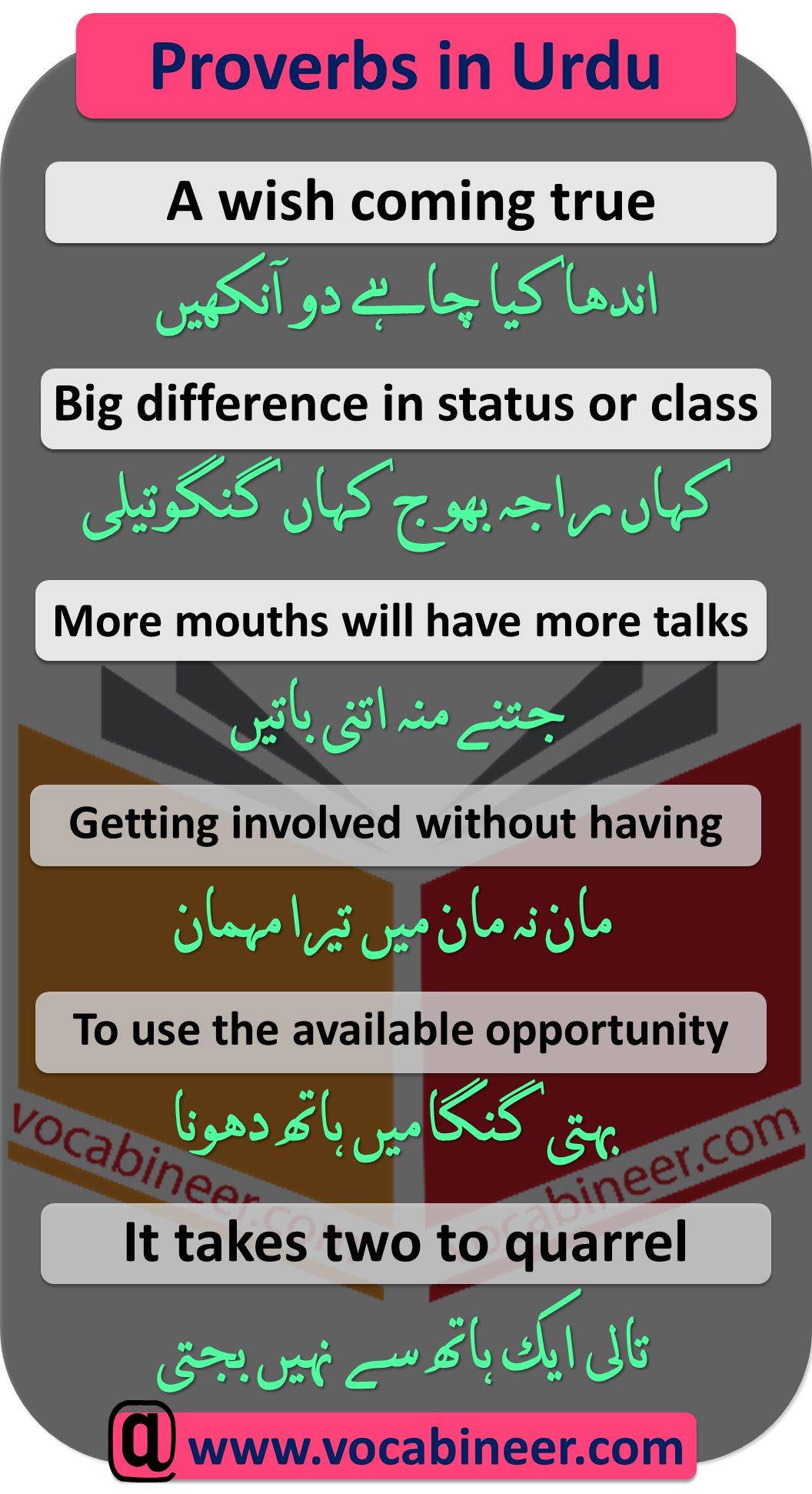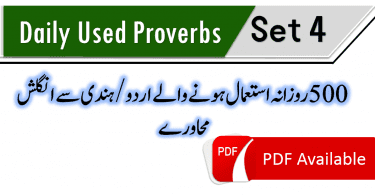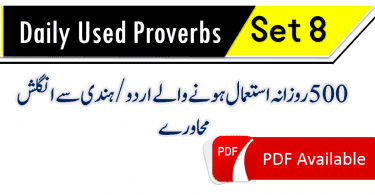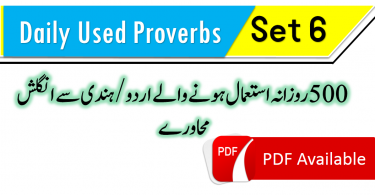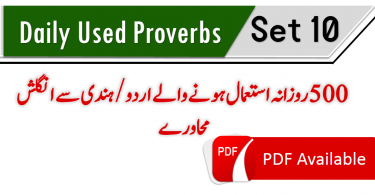Learn 50 commonly used English proverbs with their Urdu meanings to express your ideas effectively. Proverbs are short sayings that offer advice or reveal truths, making them simple yet powerful tools for communication.
This guide includes Urdu translations of popular proverbs, helping you understand their meanings and use them in daily conversations. Start learning today and enhance your language skills with these timeless expressions of wisdom!
In This Page
50 Proverbs Meaning in Urdu Video Lesson

ایسی مزید وڈیوز کےلیے ہمارا یوٹیوب چینل سبسکرائب کیجیے۔ شکریہ
Proverbs Meaning in Urdu
| Proverbs | Translation |
| If Allah wills not, no one can harm | جسے اللہ رکھے اُسے کون چکھے
(jisay allah rakhay usay kon chakhay.) |
| A wish coming true. | اندھا کیا چاہے دو آنکھیں
(andha kiya chahay doo ankhan) |
| Nothing comes amiss to a hungry man | بھوکے کو سوکھی بھی چپڑی کے برابر
(bhokay ko sokhi bhi chopri k baraber) |
| Opposite qualities of meaning of person’s name. | آنکھ کا اندھا نام نین سکھ
(aankh ka andha naam naeen-sokh) |
| Big difference in status or class | کہاں راجہ بھوج کہاں گنگوتیلی
(kahan raja bojh kahan gangotli) |
| Opposite qualities of meaning of person’s name | آنکھ کا اندھا نام نین سکھ
(aankh ka andha naam nain-sukh) |
| To show anger after getting embarrassed | کھسیانی بلی کھمبا نوچے
(khasyani billi kahmba nochay) |
| Money earned the wrong way will be taken away, would be lost | چوری کا مال موری میں
(chori ka maal mori maen) |
| Big difference in status or class | کہاں راجہ بھوج کہاں گنگوتیلی
(kahan raja bhojh kahan gangoteli) |
| To talk big without having a big position | چھوٹا منہ بڑی بات
(chota moun bari baat) |
| More mouths will have more talks | جتنے منہ اتنی باتیں
(jitnay moun utni baaten) |
| Getting involved without having | مان نہ مان میں تیرا مہمان
(maan na maan maen tera mahmaan) |
| Money earned the wrong way will be taken away, would be lost | چوری کا مال موری میں
(chori ka maal mori main) |
| The grass is always greener on the other side | دور کے ڈھول سُہانے
(door k dhol sohanay.) |
| A person of no principles | گنگا گائے گنگا داس جمنا گائے جمنا داس
(ganga gaay ganga daas jamna gaay jamna daas) |
| Division is main reason for the damage | گھر کا بھیدی لنکا ڈھائے
(ghar ka bahdi lanka dahay) |
| To use the available opportunity | بہتی گنگا میں ہاتھ دھونا
(behti ganga main hath dhona) |
| One is afraid of his/her crime | چور کی داڑھی میں تنکا
(chor ki darhi maen tinka.) |
| Evidence does not need proof | ہاتھ کنگن کو آرسی کیا
(hath kangan ko arsi kya) |
| As you sow so shall you reap | جیسی کرنی ویسی بھرنی
(jasi karni wasi bahrni) |
| No use crying over spilt milk. | اب پچھتائے کیا، جب چڑیاں چگ گئیں کھیت
(ab pachtay kya, jab chirean chog gaen khait) |
| It takes two to quarrel. | تالی ایک ہاتھ سے نہیں بجتی
(taali ak hath say nahi bajti.) |
| A person try to be on two sides goes nowhere | دھوبی کا کتا نہ گھر کا نہ گھاٹ کا
(dhobi ka kutta na ghar ka na ghat ka) |
| Where there’s a will, there’s a way | جہاں چاہ وہاں راہ
(jahan chah wahan rah.) |
| Once bitten twice shy. | دودھ کا جلا چھاچھ بھی پھونک کر پیتا ہے
(doodh ka jala chach bi phonk kar pita hay.) |
| Grapes are sour | انگور کھٹے ہیں
(angoor khatay hain) |
| In Rome do as the Romans do | جیسا دیس ویسا بھیس
(jasa daes wasa bahes) |
| Casting pearls before swine | بندر کیا جانے ادرک کا سواد
(bandar kya janay adrak ka sawad) |
| No man can serve two masters. | ایک میان میں دو تلواریں نہیں سماتیں
(ak miyan maen doo talwaren nahi samaten.) |
| More to it than meets the eye | دال میں کالا
(daal maen kala) |
| Empty vessels make more noise. | تھوتا چنا باجے گھنا
(khota chahna bajay gahna.) |
| Between the devil and the deep-sea | آگے کنواں پیچھے کھائی
(aagy kuwan pechay khaee) |
| A fog cannot be dispelled by a fan. | اوس چاٹنے سے پیاس نہیں بجھتی
(oas chatnay say piyas nahi bojhti) |
| Rubbing salt on one’s wound | جلے پر نمک چھڑکنا
(jalay par namak cherkna) |
| Birds of same feather flock together. | چور چور مسیرے بھائی
(chor chor masaray bhai) |
| A poor worker blames his tools | ناچ نہ جانے آنگھن ٹیڑھا
(naach na janay angan terha) |
| Do evil and look for like | کر برا تو ہوئے برا
(kar bora to hoay bora.) |
| All’s well that ends well | انتھ بھلا تو سب بھلا
(anth bhla to sab bhla) |
| Fool to others to himself a sage | اپنے منہ میاں مٹھو
(apnay mun miyan mitho.) |
| Good mind, good find | آپ بھلے تو جگ بھلا
(aap bahlay to jag bahla) |
| His wits are gone a wool gathering. | اسکی عقل چرنے کو گئی ہے
(uski aqal charnay ko gai hay) |
| Barking dogs seldom bite | جو گرجتے ہیں وہ برستے نہیں
(jo garajtay han wo barastay nahi.) |
| Blood is thicker than water | اپنا اپنا ،غیر غیر |
| You can’t get oil from stones | اِن تِلوں میں تیل نہیں |
| A drop into the ocean | اونٹ کے منہ میں زِیرہ |
| Puff not against the wind | آسما ن کا تھوکا منہ پر آتا ہے |


